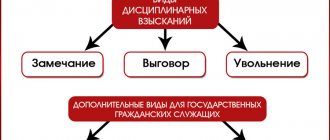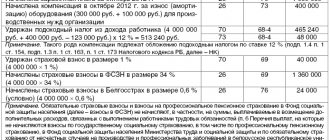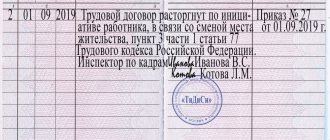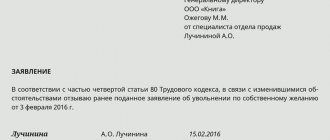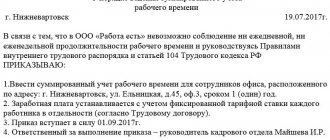Home / Labor Law / Dismissal and layoffs / Dismissal
Back
Published: 01/12/2018
Reading time: 8 min
0
6963
There are categories of people who believe that taking, for example, a couple of packs of paper or bags of cement from their work (depending on who works where) is not a crime. In fact, this is not true at all.
According to paragraphs. "g" clause 6, part 1, art. 81 of the Labor Code of the Russian Federation, theft at work is a reason for dismissal .
But there is a caveat: in order to dismiss on this basis, a court decision or a ruling on an administrative offense, issued by the competent authority based on the results of consideration of a report of identified theft, must have entered into force.
- Dismissal of an employee under article
- Who doesn't get fired for stealing?
- Dismissal procedure Detection of theft, collection of information confirming it
- Contacting law enforcement agencies
- Receipt of a court verdict or other act issued based on the results of consideration of an application for identified theft
- Entry of a sentence or administrative act into legal force
- Issuance of a dismissal order
- Making an entry in the work book
- Calculation and issuance of a work book to an employee
Dear readers! To solve your problem, call hotline 8 or ask a question on the website. It's free.
Ask a Question
Basic Concepts
The law does not allow for ambiguity or variability of interpretation. The wording prescribed in the Labor Code of the Russian Federation is extremely important. An illegal action on the part of an employee, interpreted by the employer as theft, may be interpreted differently by the court. Let's consider the basic concepts that are used within the framework of dismissal on the grounds of theft:
- Termination of an employment agreement due to theft is carried out on the basis of paragraph “d” of paragraph 6 of Article 81 of the Labor Code of the Russian Federation. According to the law, an employee can be fired only if a court decision has entered into legal force regarding the theft.
- An employee, as stated in the Labor Code of the Russian Federation, can only be fired if there is theft in the workplace. This workplace must be reflected in the employment agreement. For example, this could be the address of a company.
- If an employee works in a branch, his workplace will be him (based on Article 57 of the Labor Code of the Russian Federation).
- The workplace may be a company to which the employer sent an employee as part of a business trip.
- An employee is fired for stealing someone else's property. Other people's property means any property that does not belong to the employee. If an employee stole property that does not belong to the company and is used as part of a lease agreement, the case will proceed according to general principles. These may also be personal items that belong to other professionals.
- Dismissal can only be carried out if there was intent. If the theft occurred unintentionally (for example, an employee confused someone else’s item with his own), there will be no corpus delicti in the case.
If the listed elements are not present in the case, dismissal cannot be carried out. For example, the theft did not occur at the workplace. In this case, a case of theft is being considered in court, but this cannot be a basis for dismissal.
To terminate an employment agreement, it is also necessary to comply with these conditions:
- The presence of a court verdict by which a person is found guilty (it must enter into force).
- An employee can only be fired within a month from the date of the theft (or from the date the offense was discovered).
IMPORTANT! The court verdict comes into force only after the deadline for appealing it has expired.
What is the difference between theft and embezzlement?
Theft is a form of theft, which is a crime against someone else's property. It is punishable under Art. 158 of the Criminal Code of the Russian Federation. Theft is a gratuitous unlawful seizure of property that caused damage to its owner and was committed for mercenary purposes.
The concepts of “theft” and “theft” are used in the Criminal Code and the Code of Criminal Procedure of the Russian Federation, and there are several significant differences between them:
| Theft | Theft |
| Is a form of theft | A broader concept that includes theft and other crimes committed against property |
| It is always only hidden | Can be open |
| Committed without violent action against the owner of the property | Often accompanied by beatings and mutilations of the owner |
| The maximum term of serving the sentence is 10 years | The sentence is increased to 15 years, especially if the theft was associated with the use of violence |
“Theft in the workplace should be understood as the theft of property, and it does not necessarily belong to the organization. These could be personal belongings of other employees, or goods located within the company’s territory under the terms of a storage agreement,” says O.V. Shcherbinina, group economist.
Who can be fired for embezzlement or theft?
Termination of an employment agreement for a crime committed against property is possible only after a court decision or administrative decree - it all depends on the severity of the crime.
Most often, theft of enterprise property or money from the budget occurs in the workplace, but the dismissal procedure must be preceded by a detailed investigation to identify the perpetrators.
Is it possible to dismiss an employee without a court verdict?
Firstly, it must be said that the following persons cannot be fired due to theft:
- Pregnant employees.
- Persons who are on vacation or sick leave.
- Employees who already have a disciplinary sanction for theft.
Not all employers are ready to go to court. Is it possible to do without this? There are several options:
- The employee is dismissed for another reason, which does not involve going to court. For example, an employee may be fired under the article “Loss of trust.”
- Dismissal of a person at his own request. In this case, the employer will have to negotiate with the employee.
- Dismissal with an entry of theft in the work book without trial.
The last option is the most risky. In this case, the employer is breaking the law. An employee can easily challenge his dismissal.
How is an employee fired for theft of government property?
In the process of work, unfortunately, you can encounter different situations. One of the unpleasant and punishable moments is the theft of enterprise property by its workers.
How to deal with this problem, how to punish guilty persons, whether there are categories of citizens who cannot be fired for theft, as well as other points, we will consider in more detail. In addition, we will talk about how wages are calculated for such employees and other nuances related to theft at work.
Dear readers! Our articles talk about typical ways to resolve legal issues, but each case is unique.
If you want to find out how to solve your particular problem, please use the online consultant form on the right or call. It's fast and free!
What is a settlement for workplace theft?
There are some employees who can take a couple of pencils, pens or a pack of paper away from work. But they don’t think that this is theft. Such an act may result in not only dismissal, but also criminal liability.
In order for the fact of theft to be officially recognized, it must be recorded not only within the company by the employer, but also established in court.
That is, if the court finds that a worker is actually guilty of an offense and makes an appropriate decision, then it is possible and necessary to dismiss such an employee on this basis. Theft in the workplace is a criminal act that involves deliberate actions to steal the property of the employer, workers or other persons who do not work at this enterprise.
What offenses apply to this?
Such offenses include:
- Theft is the secret theft of property that belongs to other persons.
- Robbery is the open or obvious theft of someone else's property.
- Possession of someone else's property . Illegal and gratuitous expenditure of someone else's property, which was entrusted to the employee. At the same time, the culprit did not compensate for the money spent.
- Fraud is the theft or acquisition of rights to property belonging to other persons or a company through deception or breach of trust.
- Theft and violence . Violent actions when stealing someone else's property is robbery. This may include appropriation of property with the threat of violence. If a person begins to threaten with a knife or other objects, then this is no longer robbery, but an assault.
- Intentional damage to property . An employee's dismissal may result from intentional damage or destruction of someone else's property.
- Refusal of compensation . Theft of property entrusted to a person without payment of compensation.
In simple words, the culprit uses the property for his own selfish purposes, and theft from a legal point of view in this situation will begin when a person begins to use what does not belong to him to obtain personal benefits.
For example, if a driver buys cigarettes worth 200 rubles on the way to work, takes money from workers, and then puts it back before returning, then this is not considered embezzlement. It is also important to understand the difference between spending and alienation.
Are there categories of employees who cannot be fired for theft at work?
It is impossible to dismiss an employee who has committed theft if she is in a position . In such a situation, the employment contract can only be terminated if the organization is completely liquidated. This point is clearly regulated by Article 261 of the Labor Code of the Russian Federation.
It is prohibited to impose disciplinary sanctions on workers who are on vacation or have an officially opened sick leave. Dismissal is made only after returning to work.
If a penalty has already been applied for an offense that does not imply dismissal (for example, a reprimand), then it is prohibited to impose a second punishment for the same act . This point is explained in Article 193 of the Labor Code of the Russian Federation.
How to fire under article for theft?
Step-by-step instructions Termination of business relations in this situation is carried out in accordance with Article 81 of the Labor Code of the Russian Federation, paragraph 6. This article must be referred to in all dismissal accompanying documentation as a basis. The data is processed according to the following algorithm:
It is necessary to detect the fact of theft . The management of the enterprise should involve two persons as witnesses and draw up the corresponding act. Then notify the police. The latter is not necessary if the employer decides to resolve the problem amicably on his own.
The fact of theft must be documented - by drawing up a report. This document will be required in the future in court, if the case does come to him. The report must be filled out by the person who noticed the theft. The document records the following data:
- In the upper right corner is the full name of the head of the company and his position.
- Full name of the employee who discovered the theft.
- The name of the document is a memorandum.
- The circumstances under which the theft occurred.
- Date of the event.
- Signature and transcript of the person filling out the document.
- Take inventory . Then an inventory is carried out if theft of the organization’s property is suspected. Based on the results of the inventory of the accounting carried out, authorized persons record an act, which will subsequently be added to the records of the records started by the police.
- Investigation . Next, an official investigation is carried out to identify the perpetrators involved in the crime. To do this, determine the approximate time of the theft, study recordings from video cameras and perform other actions that will help identify the picture of the crime.
- Request an explanatory note . Next, the perpetrators are required to write an explanatory note. The document is filled out in free form with the obligatory indication of: full name and position of the head of the company, title of the document, full name of the initiator, explanation, date, and signature.
- report on theft committed in the workplace
- report on theft committed in the workplace
If there are several such persons, then each individual is obliged to present his/her explanations. Two days are allotted for drawing up explanatory notes, after which the company’s management records a special act of refusal to provide them.
Information that must be present in the act and is mandatory:
Number, date, place of execution of the document.
- Full name of the enterprise.
- Full name, position and personnel number of the guilty employee.
- The composition of the commission consists of witnesses who certified their refusal to give explanations.
- The reason why an explanatory note was required from the worker.
- Links to the relevant law.
- Full name, personnel number and position of the worker.
The claim must be accompanied by papers that serve as evidence of the crime committed. and witness statements can be used as evidence The claim is sent to the arbitration court. The employer receives a copy of the court's verdict.
Article 199 of the Code of Civil Procedure of the Russian Federation clearly explains that the court decision must be formalized in full and transferred to the office within five days from the date of its official announcement. Accordingly, you can pick up a copy of the document within the specified period.
Obtaining a decision from a judicial authority. If the court makes a decision that the suspects are guilty, then these workers have only 10 days to appeal this verdict.
- Next, the responsible persons of the HR department or other authorized employees draw up and issue orders on the application of disciplinary sanctions and dismissal. The dismissal order is drawn up in the unified form T-8, with a reference to Article 81 of the Labor Code of the Russian Federation, paragraph 6, and the decision of the judicial authorities as the basis.
Before issuing an order to sever business relations, the management of the enterprise should prepare an order to impose a disciplinary sanction, which will be one of the grounds for dismissal. The following rules must be followed:
- Both administrative acts contain a reference to the norms of the Labor Code of the Russian Federation.
- The exact wording is prescribed, as well as information about the decision confirming the commission of a crime.
- The worker’s data is recorded (full name, position, personnel number, division or department where he worked).
- It is necessary to indicate the date of dismissal and the order number.
- The preparation of administrative documents is preceded by familiarization with the explanatory note. If this point is not taken into account, this is considered a violation on the part of the employer, because the investigation must be objective.
- Signatures of authorized persons drawing up orders and the head of the company.
- Signatures of the culprit of the event.
- order to impose a disciplinary sanction
- order to impose a disciplinary sanction
- Download the bank of the dismissal order in form T-8
- dismissal orders in form T-8
It is necessary to enter into the work book all the information that is specified in the dismissal order, namely:
- base;
- date of termination of the employment relationship;
- link to legislation.
The dismissal record is as follows: “The employee is dismissed on the basis of paragraph “d”, clause 6, part 1 of Article 81 of the Labor Code of the Russian Federation in connection with the fact of theft of company property.”
The book must be issued to the worker on the last working day . And in case of dismissal of an employee, the extradition is carried out immediately after the court decision enters into legal force.
What payments are included in the calculation in this situation?
When dismissed for theft of property in the workplace, the worker must receive wages for the period actually worked before dismissal . Consequently, if the culprit was in custody during the investigation, no one will pay him for this time.
Moreover, upon dismissal, monetary remuneration is paid for unused vacation and other amounts due, for example, bonuses. All accruals are made on the day of dismissal, which is considered the last working day. This point is explained in Articles 84 and 140 of the Labor Code of the Russian Federation. If the employee did not work on the day of dismissal, then these amounts must be paid no later than the next day after the dismissed person presents the corresponding demand in accordance with Article 140 of the Labor Code of the Russian Federation.
Article 140 of the Labor Code of the Russian Federation. Payment terms upon dismissal
Upon termination of the employment contract, payment of all amounts due to the employee from the employer is made on the day the employee is dismissed. If the employee did not work on the day of dismissal, then the corresponding amounts must be paid no later than the next day after the dismissed employee submits a request for payment.
In the event of a dispute about the amount of amounts due to the employee upon dismissal, the employer is obliged to pay the amount not disputed by him within the period specified in this article.
However, the Labor Code of the Russian Federation does not stipulate the form of such treatment. This means that an oral statement from the employee is sufficient. The employer does not have the right to deduct the amount of damage caused by theft of property from the amounts paid upon dismissal. These funds are recovered through civil proceedings .
What are the terms for terminating an employment contract?
The management of the enterprise has one calendar month to make a decision on terminating the employment relationship with the worker after the court verdict enters into legal force. This point was clarified by the PP of the Supreme Court No. 2 of the Russian Federation. After this period, the worker will automatically remain at his job, and it will be prohibited to fire him.
To summarize, we note that any misappropriated property that belonged to the company is theft . It is prohibited to fire pregnant women for theft, as well as persons who are on sick leave or on vacation. In such a situation, the employment contract can only be terminated if the organization is completely liquidated.
This point is clearly regulated by Article 261 of the Labor Code of the Russian Federation. To prove the fact of theft, it is necessary to detect it, find evidence, write a report, request explanatory notes from the perpetrators, file a lawsuit, and then, by a court decision, begin the dismissal procedure.
If you find an error, please select a piece of text and press Ctrl+Enter.
Didn't find the answer to your question? Find out how to solve exactly your problem - call right now:
+7 (Moscow) +7 (St. Petersburg)
The procedure for dismissal based on the fact of theft
Let's consider the legal procedure for dismissing an employee. This event involves many stages.
Detection of theft
It is recommended to document the fact of theft. This is part of the evidence that will be used in court. It is recommended to prepare a report. It is processed by the person who discovered the theft. The note contains the following information:
- Full name of the employee who identified the theft.
- The circumstances under which the theft occurred.
- Date of theft.
Theft is often discovered during the inventory process. In this case, no report is required. All necessary information is recorded in the inventory report.
Obtaining explanations from an employee
An explanatory note is requested from employees, in which the guilty person clarifies the details of the offense. If an employee refuses to give an explanation, this refusal must be registered. The employee is given 2 days to write the note. Therefore, the act of refusal can only be drawn up 2 days after the request. An explanatory note must be requested even if the court decision has entered into force. Article 193 of the Labor Code of the Russian Federation does not provide for any exceptions to giving explanations.
Filing a claim
The employer needs to file a claim. It contains all the related information:
- Full name and position of the employee.
- Information about the company.
- Circumstances of the theft.
- List of documents that are attached to the claim.
The claim must be accompanied by documents that serve as evidence of the illegal action. Video camera recordings and witness statements can be used as evidence. The claim is sent to court. The employer receives a copy of the court's verdict.
Issuance of a dismissal order
Dismissal on the grounds of theft, according to Part 3 of Article 192 of the Labor Code of the Russian Federation, is a disciplinary sanction. Therefore, the manager needs to issue two documents at once:
- An order to bring the worker to disciplinary liability in the form of termination of the employment agreement.
- Order to terminate the employment agreement.
The last order must indicate the details of the order to hold the employee accountable, as well as the details of the court verdict. The guilty person must be familiarized with all orders against signature. If an employee refuses to review the documents, a corresponding note must be made in the order.
FOR YOUR INFORMATION! As a rule, the employer issues only one order in the T-8 form. However, this is not entirely correct. The risk is that the employee may challenge the dismissal during which all the necessary documents were not completed.
IMPORTANT! A dismissal order can be issued only after the manager has received a court decision. It must take effect.
Making an entry in the work book
An entry in the following form may be made in the book:
“The employee was dismissed on the basis of paragraph “g”, paragraph 6, part 1 of Article 81 of the Labor Code of the Russian Federation in connection with the fact of theft of company property.”
There should be no abbreviations in the wording; numbers are written in words. The book must indicate the date of dismissal, as well as the number of the order on the basis of which the contract is terminated. The work book must be issued to the employee on the day of dismissal.
Carrying out calculations
On the day of dismissal, the employee makes the following payments:
- Salary for the period worked.
- Compensation for unused vacation.
- Awards.
Compensation for damages cannot be withheld from these payments. Collection is carried out exclusively within the framework of civil proceedings.
Who doesn't get fired for stealing?
It is difficult to imagine that an employee convicted of theft will want to remain in the team, where everyone can point a finger at him. In such a situation, a person, most often, tries to agree on a more acceptable article of the Labor Code in the labor contract, and not on maintaining a job. However, there are also specialists who are not dismissed even on such grounds:
- pregnant women, st. 261 Labor Code of the Russian Federation;
- absent for a valid reason (vacation or sick leave), Art. 81 Labor Code of the Russian Federation;
- employees in whose court verdict guilt was established, but intent was not found;
- situations where the theft is discovered after the deadline for applying penalties has expired, or a reprimand has already been issued for this case, Art. 192, 193 Labor Code of the Russian Federation.
It must be said that it is permissible to apply punishment to vacationers and sick people after they return to work, since these periods are excluded from the validity period, Art. 193 Labor Code of the Russian Federation. It is more difficult to apply penalties in the last two cases.
It is important that in the process of investigating the actions of dishonest workers, law enforcement officers and the court establish not only the degree of guilt, but also intent or prior conspiracy. In order to formalize dismissal for theft (clause d) clause 6 of Art. 81 of the Labor Code), mention of the intentionality of theft or embezzlement is a prerequisite. If the judge has determined that the loss of property occurred due to oversight or negligence, but without malicious intent, the specified norm of the Labor Code cannot be applied. The maximum that can be done is to calculate the employee according to clause 7 of Art. 80 of the Labor Code of the Russian Federation, but only on condition that its functions are related to money or goods.
Controversial issues during dismissal
If we consider the law specifically, there are no controversial issues in dismissal for theft. The procedure for terminating the agreement is quite clear. However, controversial issues arise when implementing the law. For example, employers commit the following offenses:
- Dismissal without obtaining a court decision.
- Dismissal under another article if the fact of theft was discovered.
- Withholding compensation from payments due upon termination of the contract.
Any mistakes during dismissal are disadvantageous, first of all, for the employer. If there are shortcomings, the employee has the opportunity to challenge the manager’s decision.
How to fire an employee for embezzlement or theft in the workplace?
Every person has known the truth since childhood: taking someone else’s property is strictly prohibited. And if a child can simply be shamed for an offense, then for an adult who has not learned the parental order, a completely different measure of responsibility for what he has done is provided. For a person convicted of theft, the least evil would be a simple dismissal for theft, because as a result of the proceedings, the prospect of a real criminal sentence is very likely.
What is considered theft, theft, theft, etc.?
Important! Please keep in mind that:
- Each case is unique and individual.
- A thorough study of the issue does not always guarantee a positive outcome. It depends on many factors.
To get the most detailed advice on your issue, you just need to choose any of the options offered:
- Request a consultation via the form.
- Use the online chat in the lower corner of the screen.
- Call: Moscow region: +7
- Leningrad region: +7
- Federal number: +7
In the case of theft in the workplace, a personnel officer will not get by with knowledge only in the field of labor legislation. At least an introductory study of the criminal and criminal procedure codes will be required, because only they reveal in detail the legal concept of theft, or rather the methods of its commission:
- theft - secret taking of property, Art. 158 of the Criminal Code of the Russian Federation;
- robbery - a successful attempt to deprive the owner of valuables, without threat of violence, Art. 161 of the Criminal Code of the Russian Federation;
- robbery - the same actions, but with the use of force and mutilation, Art. 162 of the Criminal Code of the Russian Federation;
- fraud - deception of the victim in order to obtain his property or personal gain, Art. 159 of the Criminal Code of the Russian Federation;
- misappropriation or embezzlement – loss or use for personal purposes of the employer’s material assets entrusted to an employee, Art. 160 of the Criminal Code of the Russian Federation.
The likelihood that a current employee will commit robbery or robbery on the territory of his native enterprise is small, but other forms are much more common, since they are committed secretly or without disclosing real intentions. The hope that no one will find out about the employee's actions is what makes these types of theft the most common intentional offenses in the workplace.
https://youtu.be/0ZyJ5g97GSs
The code contains another clause that expands the scope of application in accordance with paragraph 6 of Art. 81 Labor Code of the Russian Federation. It is possible to punish a person (with a reprimand or dismissal) not only in case of theft of the employer’s property. The appropriation of the values of other people (colleagues or clients) is also punishable. In this case, the amount of damage does not matter; even minor theft within the workplace can result in dismissal.
An employer can exercise the right to dismiss an employee who has compromised himself only when the theft occurred in the workplace, within the meaning of Art. 209 Labor Code of the Russian Federation.
Who doesn't get fired for stealing?
It is difficult to imagine that an employee convicted of theft will want to remain in the team, where everyone can point a finger at him. In such a situation, a person, most often, tries to agree on a more acceptable article of the Labor Code in the labor contract, and not on maintaining a job. However, there are also specialists who are not dismissed even on such grounds:
- pregnant women, st. 261 Labor Code of the Russian Federation;
- absent for a valid reason (vacation or sick leave), Art. 81 Labor Code of the Russian Federation;
- employees in whose court verdict guilt was established, but intent was not found;
- situations where the theft is discovered after the deadline for applying penalties has expired, or a reprimand has already been issued for this case, Art. 192, 193 Labor Code of the Russian Federation.
It must be said that it is permissible to apply punishment to vacationers and sick people after they return to work, since these periods are excluded from the validity period, Art. 193 Labor Code of the Russian Federation. It is more difficult to apply penalties in the last two cases.
It is important that in the process of investigating the actions of dishonest workers, law enforcement officers and the court establish not only the degree of guilt, but also intent or prior conspiracy. In order to formalize dismissal for theft (clause d) clause 6 of Art. 81 of the Labor Code), mention of the intentionality of theft or embezzlement is a prerequisite. If the judge has determined that the loss of property occurred due to oversight or negligence, but without malicious intent, the specified norm of the Labor Code cannot be applied. The maximum that can be done is to calculate the employee according to clause 7 of Art. 80 of the Labor Code of the Russian Federation, but only on condition that its functions are related to money or goods.
Dismissal procedure
The procedure for dismissal for embezzlement or theft of an offending employee differs from the standard one in just a couple of points, but they are so important that they take up most of the time and effort of personnel workers and managers.
Detection of theft, collection of information confirming it
There are several ways that can trigger dismissal for theft:
| Detection method | Proof | Further actions |
| Inventory or audit | Inventory lists, matching statements | Draw up a report on the discovery of the shortage. Dismissal is possible without involving the police or a court decision. A prerequisite for the legality of termination of the contract will be the presence of an explanatory statement from the employee, as well as the proportionality of the punishment and the degree of guilt. |
| A report from one of your colleagues or a request from a client | Witness testimony, data from surveillance cameras, if available | If a suspected employee encroaches on property that was not legally transferred to him (for safekeeping), then the employer can only conduct a preliminary internal check. Only a court can make conclusions about guilt, so you need to start a substantive investigation by calling the police. |
Contacting law enforcement agencies
Depending on who is the victim, the statement may be written:
- official representative of the employer;
- a company employee if he assumes that the theft of his property was committed at work;
- a third party if the damage was caused to him on the territory of the enterprise (client, visitor, supplier and others).
It is exclusively the responsibility of law enforcement officers to search for evidence and collect evidence for the court. They must make a determination regarding the qualification of the case. If the situation falls under criminal law, then the police and the prosecutor's office continue to deal with it. If the amount of damage or the method of committing the theft does not indicate a crime, then a decision is made that the issue should be considered administratively. This document gives the employer the right to go to court before dismissing an employee for theft.
Receipt of a court verdict or other act issued based on the results of consideration of an application for identified theft
No matter what path the investigation into the theft takes, it must end with a verdict or a court ruling on administrative liability. Depending on its content, a decision will be made to keep the employee at work or to apply punishment in the form of dismissal. Since the employee’s fate must be decided no later than a month from the date the verdict enters into legal force, the employer, for the most part, is actively interested in the progress of the process, even if it is not his property that was damaged.
If something valuable from the company is stolen or misappropriated, the court will give the employer a copy of the decision and also notify the employer of filing an appeal. If a third party is a party to the conflict, and the employer of the accused is a witness, then you can attend the hearing and listen to the announcement of the verdict, and then apply to the court with a request to issue a copy of the decision or information on the case.
Without receiving a copy of a document confirming the employee’s guilt, it is impossible to fire a person for such a “bad” article. In addition, the day of dismissal must be consistent with the dates of the verdict and the consideration of appeals.
You can fire an employee even for petty theft, but only if it is proven that the person acted with intent and for personal gain.
Entry of a sentence or administrative act into legal force
The maximum punishment from an employer for proven theft in the workplace can only be dismissal. However, no matter how much the leader rushes to “repay” for the committed act, one should remember the deadlines.
If the investigation confirmed the suspicions of the authorities, and the court has already passed a verdict, then there is no need to rush. The law gives the employee 10 days to file an appeal to challenge the decision of the panel of judges. Only after the expiration of the specified period can an order of dismissal be issued for theft in the workplace, paragraphs. d) paragraph 6 of Art. 81 Labor Code of the Russian Federation. If the employer did this even a day earlier, the same court will reinstate the employee in his position and force him to pay for the time of forced absence.
Paradoxically, delaying the decision to terminate the employment contract is also not beneficial for the employer. As soon as the decision comes into force, the 30-day period begins to count, during which a settlement can be made to the unconscious employee. And then a delay in this even for one day will make the dismissal illegal, Art. 193 Labor Code of the Russian Federation.
The Labor Code has another restriction on imposing penalties. For actions that could not be detected immediately, “statutes of limitation” are established, Art. 193 Labor Code of the Russian Federation:
- 6 months – from the date of commission of the guilty act;
- 2 years - for those acts that can be discovered only after an audit or audit.
If the employer has already managed to reprimand the employee who was stealing for the fact of theft, then dismissal on the same grounds will be unlawful, Art. 192 Labor Code of the Russian Federation.
Issuance of a dismissal order
Despite the extraordinary circumstances, the order is issued in the unified form T-8. All the features of the current situation will be reflected in the basis column, in which you must indicate:
- the reason for dismissal, at least briefly (theft, loss, embezzlement of funds or intentional damage to property);
- subparagraph d) of paragraph 6 of Article 81 of the Labor Code of the Russian Federation;
- details of the document that gave the right to draw up this order (court verdict, decision in administrative proceedings, act on registration of inventory results).
Making an entry in the work book
In case of dismissal for theft, making records in the labor record is one of the simplest steps. On its pages you just need to transfer all the information that is already contained in the order:
- date of calculation (last day of work or the day the sentence to serve the actual term comes into force);
- wording on the grounds from the order itself (here you can enter data about the court decision, or you can simply write that the person is being fired for intent
real theft);
- link to pp. d) clause 6 of Art. 81 Labor Code of the Russian Federation.
- details of the management order;
- signature of the person responsible for personnel and seal of the enterprise.

